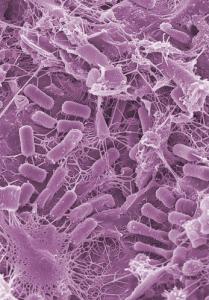

This post was written on location by Oregon State University Student and SBE Member, Madeline Midgett.
Rewiring Gene Circuity
The second session focused on how recent advances in synthetic biology have expanded the field of biology, and the potential of the research to engineer new organisms. The first speaker, Michael Elowitz from the California Institute of Technology, set up the session by explaining how rewiring excitable gene circuits can allow control over differentiation.

Gene Networking Engineering
Julius Lucks of Berkeley spoke on his research of gene network engineering, and how while microbes are most commonly used as chemical factories for food additives and fuel, he is looking toward designing smart acting microbes for environmental sensors and bioremediation. Engineered copies of natural antisense-RNA-mediated transcription attenuators are arranged in different networks to produce desired cellular function.
Diesel Production through Genome Engineering
Ryan Gill from University of Colorado at Boulder is using genome-engineering tools for diesel production, and explained how making DNA is no longer a barrier to biomolecular engineering, and that millions of genomes can be designed in a day. The next step is to improve and extend nature's design using directed evolution with the genome. Gill set out three main steps: map genes to trait, assign relevance, and then combinatorial optimize. TRackable Multiplex Recombineering (TReMR) is a tool used to search combinatorial genomic diversity to map expression and screen traits.
Understanding Microbe Communities
Another very interesting talk in the synthetic biology session was from Cynthia Collins, from Rensselaer Polytechnic Institute. Her research group is moving toward understanding communities of microbes instead of just looking at one individual microbe at a time. Microbe communities are very important in marine and soil environments, human oral health, and the human intestinal tract. Some advantages of studying whole microbe communities is that the group reduces the metabolic load on each microbe, the combined catalytic activity of single microbes create new functionalities, and communities allow for compartmentalization and modularity. Her group is working to engineer intracellular communication between microbes, while dealing with the fragile systems and mutants that often arise.


